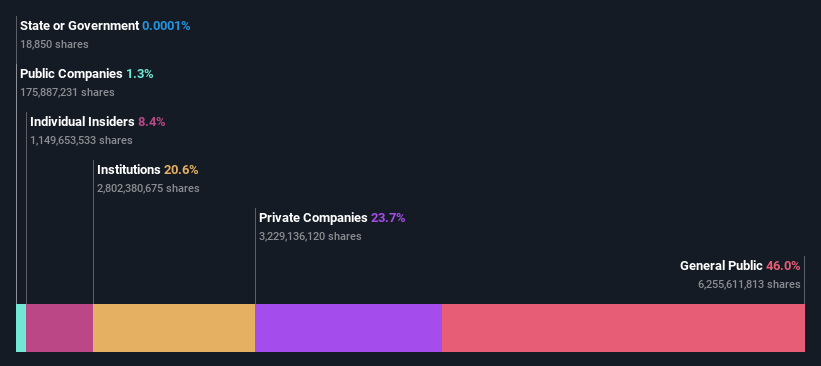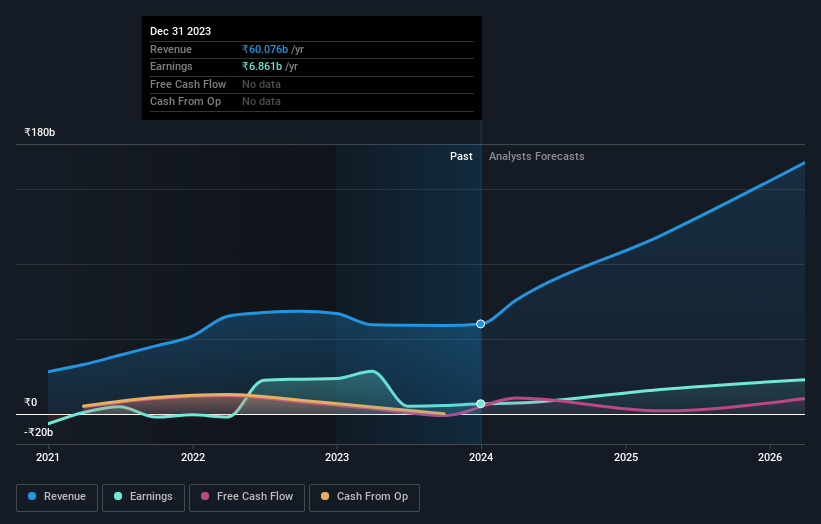Stock Analysis
- India
- /
- Electrical
- /
- NSEI:SUZLON
Suzlon Energy Limited's (NSE:SUZLON) market cap surged ₹30b last week, retail investors who have a lot riding on the company were rewarded

Key Insights
- The considerable ownership by retail investors in Suzlon Energy indicates that they collectively have a greater say in management and business strategy
- 45% of the business is held by the top 25 shareholders
- Institutional ownership in Suzlon Energy is 21%
A look at the shareholders of Suzlon Energy Limited (NSE:SUZLON) can tell us which group is most powerful. The group holding the most number of shares in the company, around 46% to be precise, is retail investors. That is, the group stands to benefit the most if the stock rises (or lose the most if there is a downturn).
Clearly, retail investors benefitted the most after the company's market cap rose by ₹30b last week.
Let's take a closer look to see what the different types of shareholders can tell us about Suzlon Energy.
View our latest analysis for Suzlon Energy

What Does The Institutional Ownership Tell Us About Suzlon Energy?
Many institutions measure their performance against an index that approximates the local market. So they usually pay more attention to companies that are included in major indices.
We can see that Suzlon Energy does have institutional investors; and they hold a good portion of the company's stock. This can indicate that the company has a certain degree of credibility in the investment community. However, it is best to be wary of relying on the supposed validation that comes with institutional investors. They too, get it wrong sometimes. It is not uncommon to see a big share price drop if two large institutional investors try to sell out of a stock at the same time. So it is worth checking the past earnings trajectory of Suzlon Energy, (below). Of course, keep in mind that there are other factors to consider, too.

Suzlon Energy is not owned by hedge funds. Looking at our data, we can see that the largest shareholder is Tanti Holdings Private Limited with 5.2% of shares outstanding. For context, the second largest shareholder holds about 4.1% of the shares outstanding, followed by an ownership of 3.4% by the third-largest shareholder. Vinod Tanti, who is the second-largest shareholder, also happens to hold the title of Senior Key Executive.
Our studies suggest that the top 25 shareholders collectively control less than half of the company's shares, meaning that the company's shares are widely disseminated and there is no dominant shareholder.
Researching institutional ownership is a good way to gauge and filter a stock's expected performance. The same can be achieved by studying analyst sentiments. There is some analyst coverage of the stock, but it could still become more well known, with time.
Insider Ownership Of Suzlon Energy
The definition of company insiders can be subjective and does vary between jurisdictions. Our data reflects individual insiders, capturing board members at the very least. Company management run the business, but the CEO will answer to the board, even if he or she is a member of it.
Most consider insider ownership a positive because it can indicate the board is well aligned with other shareholders. However, on some occasions too much power is concentrated within this group.
We can see that insiders own shares in Suzlon Energy Limited. The insiders have a meaningful stake worth ₹44b. Most would see this as a real positive. Most would say this shows alignment of interests between shareholders and the board. Still, it might be worth checking if those insiders have been selling.
General Public Ownership
The general public-- including retail investors -- own 46% stake in the company, and hence can't easily be ignored. While this group can't necessarily call the shots, it can certainly have a real influence on how the company is run.
Private Company Ownership
Our data indicates that Private Companies hold 24%, of the company's shares. Private companies may be related parties. Sometimes insiders have an interest in a public company through a holding in a private company, rather than in their own capacity as an individual. While it's hard to draw any broad stroke conclusions, it is worth noting as an area for further research.
Next Steps:
While it is well worth considering the different groups that own a company, there are other factors that are even more important. For example, we've discovered 3 warning signs for Suzlon Energy that you should be aware of before investing here.
But ultimately it is the future, not the past, that will determine how well the owners of this business will do. Therefore we think it advisable to take a look at this free report showing whether analysts are predicting a brighter future.
NB: Figures in this article are calculated using data from the last twelve months, which refer to the 12-month period ending on the last date of the month the financial statement is dated. This may not be consistent with full year annual report figures.
Valuation is complex, but we're helping make it simple.
Find out whether Suzlon Energy is potentially over or undervalued by checking out our comprehensive analysis, which includes fair value estimates, risks and warnings, dividends, insider transactions and financial health.
View the Free AnalysisHave feedback on this article? Concerned about the content? Get in touch with us directly. Alternatively, email editorial-team (at) simplywallst.com.
This article by Simply Wall St is general in nature. We provide commentary based on historical data and analyst forecasts only using an unbiased methodology and our articles are not intended to be financial advice. It does not constitute a recommendation to buy or sell any stock, and does not take account of your objectives, or your financial situation. We aim to bring you long-term focused analysis driven by fundamental data. Note that our analysis may not factor in the latest price-sensitive company announcements or qualitative material. Simply Wall St has no position in any stocks mentioned.
About NSEI:SUZLON
Suzlon Energy
Suzlon Energy Limited, together with its subsidiaries, manufactures and sells wind turbine generators and related components in India and internationally.
Exceptional growth potential with excellent balance sheet.

